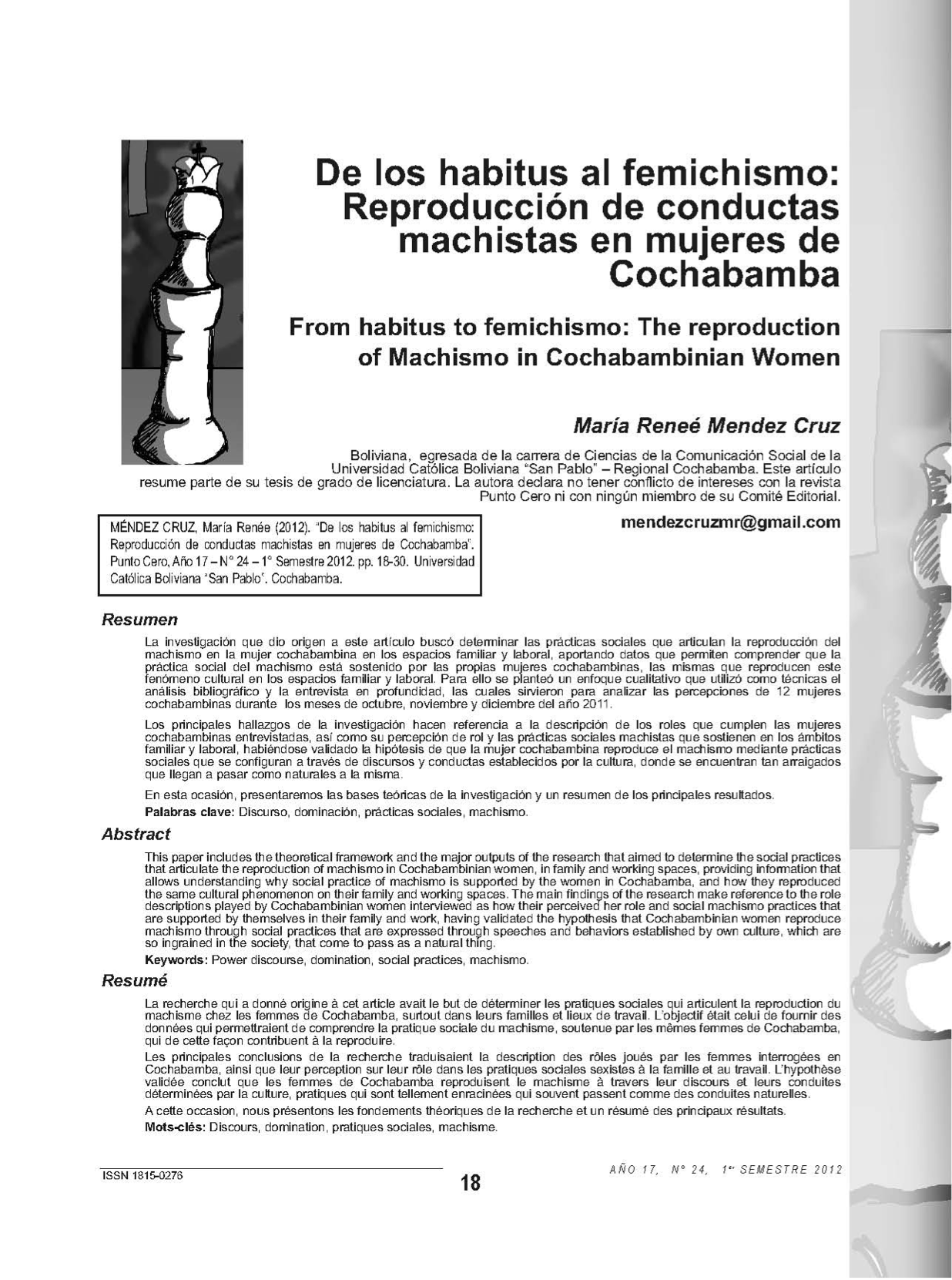From habitus to femichismo: The reproduction of Machismo in Cochabambinian Women
DOI:
https://doi.org/10.35319/puntocero.201224162Keywords:
Power Discourse, Domination, Social Practices, MachismoAbstract
This paper includes the theoretical framewor1< and the major outputs of the research that aimed to determine the social practices that articulate the reproduction of machismo in Cochabambinian women, in family and working spaces, providing inforrnation that allows understanding why social practice of machismo is supported by the women in Cochabamba, and how they reproduced the same cultural phenomenon on their family and working spaces. The main findings of the research make reference to the role descriptions played by Cochabambinian women interviewed as how their perceivedher role and social machismo practices that are supported by themselves in their family and work, having validated the hypothesis that Cochabambinian women reproduce machismo through social practices that are expressed through speeches and behaviors established by own culture, which are so ingrained in the society, that come to pass as a natural thmg.
References
AGUGLIARO, Pablo y BARREIRA, Andrea (2010). "Década de los '40: Los cambios en el rol y la indumentaria de la mujer en la Segunda Guerra Mundial", en Creación y Producción en Diseño y Comunicación Nº29 [ISSN: 1668-5229].Buenos Aires, Argentina. Universidad de Palermo en: <http://fido.pa1ermo.edu/rvicios_dyc/publicacionesdc/archivos/142_Iibro.pdf> (22 de octubre del 2011 ).
ÁLVAREZ CRUZ, Eisa Mireya (2009). "El machismo femenino o femichismo", en: <http://www.prepa5.unam.mx/profesor/publicaeiones/achismoFemeninoOFemichismo.pdf> (03 de mayo del 2011 ).
AMERICAN EXPERIENCE (2010)."Dressing the Part" en <http://www.pbs.org/wgbh/americanexperience/features/generaI-article/eleanor-ashion/> (01 de marzo del 2012).
ANTEZANA, Mythyl (2011 ). "Los roles de las mujeres siguen siendo desiguales. En, Opinión Cochabamba, Día de la madre (27 de mayo del 2011).
ARCE JUAN, María Carmen (2004 ). "El Voto Femenino" en (12 de diciembre del 2011)
BAGSPURSE.COM (2011). "1920'Fashion Trends" en <http://www.bagspurse.com/tag/1920-fashion/> (01 de marzo del 2012).
BEAUVOUIR, Simone (1949). El segundo sexo. Los hechos y los mitos. España. Editorial Siglo Veinte.
BOLPRESS (2012). "Bolivia por debajo del promedio latinoamericano en equidad de género" en <http://www.bolpress.com/art.php?Cod=2012030703> (07/02/2012)
BOURDIEU, Pierre (1991). La Distinción. Criterios y base sociales del gusto. Madrid, España. Editorial Taurus.
BOURDIEU, PieITe (199 8). "Existir para la mirada masculina", en entrevista a Pierre Bourd ieu real izada por Catherine PoIievin y tomado de la revista francesa Télérama, en <http://pierre-ourdieu.blogspot.com/2O06/06/existir-para-Iamirada.html>
BOURDIEU, Pierre (1999). Meditaciones, Pascaliana España. Editorial Anagrama.
BOURDIEU, Pierre (2007). El sentido práctico. Buenos Aires, Argentina. Editorial Siglo XXI.
CHEVALLIER, Jean Jacques (1972). Los grandes textos políticos: desde Maquiavelo a nuestros días. Espaí'ia. Madrid. Editorial Aguilar.
CUNY, The City University of New York (2011). "Las mujeres y el trabajo durante la guerra", en eadership/ spanish/las_mujeres_guerra.html> (21 de junio del 2011).
ENGELS, Federico (1884). "El origen de la familia, la propiedad privada y el estado". Ecuador. Ediciones de la revolución ecuatoriana, en <http://www.pcmIe.org/an4O/origen%20de%20Ia%20familia.pdf> (16 de junio del 2011).
GLAMOUR DAZE (2010). "World War Women - Rosie the Riveter" en <http://glamourdaze.blogspot.com/2010/10/woiid-war-two-women-rosieriveter.html> (28 de febrero del 2012).
GRAMCSI, Antonio (1977). Selección de escritos políticos (SEP) VI. Internacional Publishers, N. Y.
LAGARDE, Marcela (1996). Género y feminismo. Desarrollo humano y dernocracia. España. Horas y Horas.
LINTON, Ralph (1945). Cultura y personalidad. México. Editorial Fondo de cultura económica.
LORA, Guillermo (1991 )."La liberación de la mujer' en <http://www.masas.nu/Boton-%20G.%20Lora/Otros%20temas/17-%20La%20Iiberaci%C3%B3n%20de%20Ia%20mujer.pdf>. La Paz. Bolivia. (25 de noviembre del 2011 ).
MARX, Carlos y ENGELS, Federico (1999). Manifiesto del Partido Comunista. Quito. Editorial Libresa.
MUJERES DEL SIGLO XXI (2011)."Guía de la buena esposa" en <http://mujeresdelsxxi.wordpress.com/2011/07/26/guia-de-la-buenaesposa/> (28 de febrero del 2012).
THE GUARDIAN (2011). "A timeline of women's right to vote - interactive" en <http://www.guardian.co.uk/globaldevelopment/interactive/2011/jul/06/un-women-vote-timelineinteractive> (29 de febrero del 2012).
TIRONI ASOCIADOS (2000). "Conectándonos con el lado femenino". Santiago de Chile. Presentación PowerPoint.
TYLOR B, Edward (1971). La ciencia de la cultura. España. Editorial Anagrama edición.
WANDERERLEY, Fernanda (1995). Discriminación ocupacional y de ingreso por género. Bolivia. Editorial Grupo Design.

Downloads
Published
How to Cite
Issue
Section
License
Copyright (c) 2012 Revista Punto Cero

This work is licensed under a Creative Commons Attribution-NonCommercial 4.0 International License.








